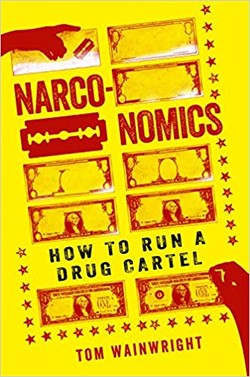Ciudad Juárez is a Mexican city with a population roughly equal to that of Daejeon. Located in the north of Mexico, the city is just a 40-minute drive away from El Paso, Texas. This makes Juárez the major border crossing point into the United States. Whoever controls Juárez, controls drug trafficking to the US market. Entering the city, you realize that it’s nothing like other Mexican cities — its streets are empty, and contrary to the typical driving style in the country, cars in Juárez keep a huge distance from each other. Such strange behavior is the result of the constant warfare between cartels in the city; no one wants to die in a random shootout. But it wasn’t always like that — before 2006, the city saw a murder rate of 400 people a year. In the years that followed, there have been about 300 murders a month.

To understand why Juárez suddenly turned into the murder capital of the world, Tom Wainwright, editor at The Economist, decided to visit the city. Exploring Juárez, as well as other hot spots of the ongoing drug warfare, he realized that cartels operate much like big corporations. As it turns out, the dreadful transformation of Juárez is not the only consequence of drug cartels’ interest in the city. Despite the widespread war on drugs declared in many parts of the world, the global drug consumption rate has only increased. To understand why this is the case, Wainwright decided to study the cartels closely from an unusual perspective — using the metrics of economics.
Narconomics reads like a detailed guide on how to run a drug cartel. Wainwright breaks down the book into ten chapters, each explaining the specifics of running a cartel from a business point of view. The book starts with an introduction to the cocaine supply chain. From there, he dives into a description of how the business is done in Mexico. The usage of common economics terms in relation to drug cartels is, to say the least, unusual. It is both amusing and disturbing to read how cartels complain about their “corporate” problems such as the ridiculously high rate of employee turnover, or the lack of qualified human resources. He also explains that violence is not a side-effect of the organized crime; in fact, it is the foundation upon which cartels run their business. Just like corporations, cartels occasionally suffer from unfair competition. But unlike their legal counterparts, they can’t sue their competitors — and thus they resort to violence, the only way to enforce their claims. So whenever cartels plan to expand into new markets, there is always a surge in violence — because bribing local officials is simply not enough. The more you read about them, the more you realize that the business of cartels is pure capitalism, in its most violent and ruthless form.
One might think that cartels and the violence they wreak is an issue exclusive to Mexico. Wainwright claims that this is not the case — while Mexico suffers from the cartels’ scramble for marijuana, cocaine, and heroin markets, the developed world also has a serious problem with synthetic drugs. Speaking in start-up terms, synthetic drugs, along with online illegal drug stores, have disrupted the markets from Ireland to Russia. If you want to get high, you can order drugs online through the Dark Web, where sites designed like Amazon offer a variety of drugs along with detailed product descriptions, high-quality pictures, and user reviews. Unlike rude dealers on the street, online sellers are polite and willing to answer any questions. They even go as far as to offer refunds in case of package loss. Wainwright describes how the Internet has transformed many industries, and the sale of illegal drugs is not an exception.
Narconomics is a perfect introduction to the essence of drug trade and the many shortcomings of drug enforcement policies. The thorough description of the drug business proves that current measures designed to fight the drug industry are largely in vain. Governments think that running expensive military operations and mass eradication of coca plantations will reduce the demand for illegal drugs. But as Wainwright proves in Narconomics, they fail to understand the basic principles of economics when it comes to fighting organized crime. Running a drug empire is not easy, and the cartel leaders have a lot in common with CEOs from the Fortune 500 list. After all, successful crime syndicates on an international level can’t be run by idiots.

